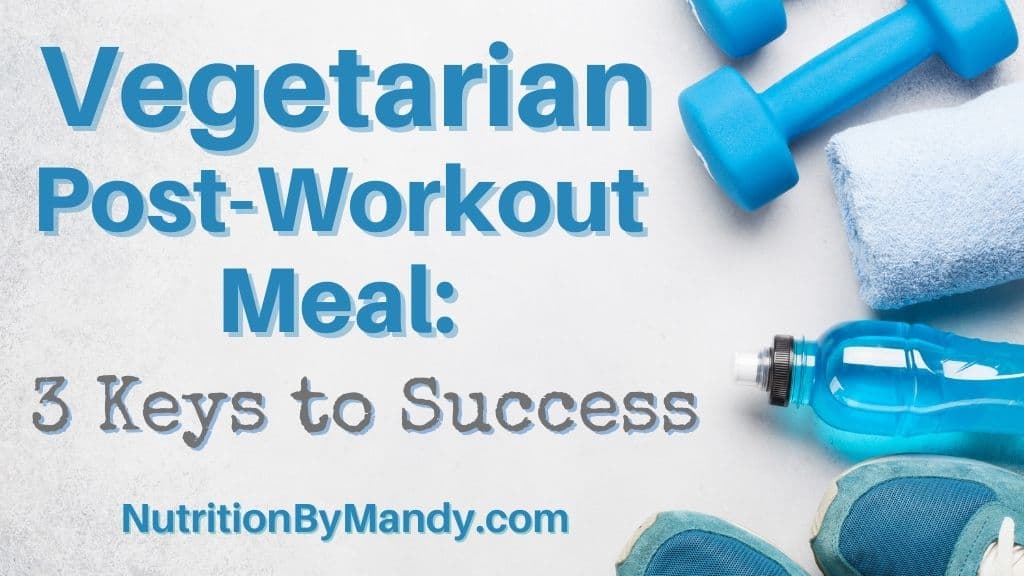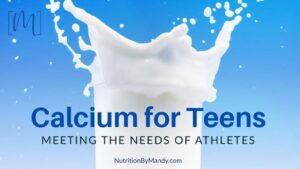Last Updated on November 1, 2024 by Mandy Tyler, M.Ed., RD, CSSD, LD
Vegetarian Post Workout Meal: 3 Keys to Success
Individuals following a vegetarian diet may wonder what foods are best to eat post-workout. With all the information available online it can be confusing to know what to eat to support recovery.
Let’s look at what following a vegetarian diet means. Then we will explore three keys to building a vegetarian post-workout meal.
Types of Vegetarian Diets
It is important to note that athletes following a vegetarian diet may differ in the types of animal-based products they will consume.
Common terminology used to describe different types of vegetarian diets include (1).
- Vegetarian – Avoids all animal/seafood flesh foods (meat, poultry, pork, seafood), may or may not consume dairy or egg products.
- Lacto-vegetarian – Follows a vegetarian diet, will consume dairy products, but not eggs or egg products.
- Ovo-vegetarian – Follows a vegetarian diet, will consume eggs and egg products, but not dairy products.
- Lacto-ovo-vegetarian – Follows a vegetarian diet, will consume dairy and egg products.
- Vegan – Will not consume any animal-based products, including eggs, dairy, and sometimes honey.

3 Keys to Building a Vegetarian Post-Workout Meal
After a workout, there are three key concepts to keep in mind to promote recovery – hydrating, replacing carbohydrate stores, and consuming protein to build and repair muscles.
When building a post-workout meal, these three recovery nutrition keys will set you up for success.
- Key #1: Hydrate to replace fluid and electrolytes
- Key #2: Carbohydrates to refill energy stores
- Key #3: Protein to build and repair muscle

Vegetarian Post-Workout Meal: Hydrate
Following a workout, it is important to hydrate and replace the fluid and electrolytes lost in sweat.
An easy way to determine how much fluid you lost during exercise is to weigh yourself before and after activity. The amount of body weight lost is reflective of how much fluid you lost in sweat during the activity.
To replace this fluid, you need to drink more fluid (125%-150% more) than the amount lost in sweat. For example, for each pound of body weight lost during the activity, you should aim to drink ~20-24 oz (2.5-3 cups) of fluid (2).
When you have limited time before your next exercise session, replacing this fluid is especially important to ensure you start your next workout in a hydrated state.
Replacing Electrolytes Post-Workout
In addition to fluid, individuals lose electrolytes when they sweat. The main electrolyte lost in sweat is sodium.
Including sodium in the post-workout meal can help with replacing sweat losses from activity. Consuming sodium is also beneficial in the post-workout meal, as it helps your body to retain the fluid you drink (3).
Vegetarian Post-Workout Meal: Foods Containing Sodium
Ideas for foods containing sodium that can be added to your vegetarian post-workout meal include:
- Pretzels
- Snack crackers
- Salted nuts and seeds
- Pickles, olives
- Tomato sauce
- Vegetable juice
- Vegetarian broth-based soups
An added benefit of salty food is that it stimulates thirst, which can help encourage you to drink more fluid with the meal (3).
*Note: Talk with your doctor or a sports dietitian nutritionist about staying hydrated if you are required to limit your fluid or sodium intake.

Vegetarian Post Workout Meal: Carbohydrates
During activity, carbohydrates are used to provide your body with the energy they need to train and perform at your best.
As you exercise, especially at high-intensities or for prolonged periods of time, you deplete their body’s stores of carbohydrates, Thus, foods high in carbohydratesare an important part of a vegetarian post-workout meal.
During the post-workout period, it is recommended that individuals consume 1-1.2 grams of carbohydrate per kilogram body weight (2). This is particularly important if you have limited time before your next workout session and a speedy recovery is needed.
To provide a food point of reference, the serving sizes below each provide ~30 grams of carbohydrates.
- 1 large banana
- 2/3 cups cooked rice or pasta
- 1 cup orange juice
- 2 thin slices of bread
- ½ large (4-oz) deli bagel
Vegetarian Sources of Carbohydrates
There are numerous ways individuals following a vegetarian diet can meet their carbohydrate needs with the post-workout meal.
Here are a variety of ideas:
- Grains: Rice, pasta, quinoa, bread, bagels, wraps, tortillas, breakfast cereal, oatmeal
- Fruit: Fresh, frozen, dried, canned (natural syrups), 100% fruit juice, applesauce, fruit smoothie
- Starchy Vegetables: Potatoes, sweet potatoes, winter squash, corn, peas, beans, legumes
- Dairy (lacto-vegetarians): Milk and yogurt

Vegetarian Post-Workout Meal: Protein
Another key nutrient in a vegetarian post-workout meal is protein. Protein recommendations for athletes are generally provided based on the athlete’s body weight.
For those who like specific numbers, individuals should aim to eat ~0.25-0.3 grams of protein per kg of body weight with the post-workout meal (2, 4) . In general, this calculates to be in the range of 20-40 grams of protein (4), with larger athletes needing more protein than smaller athletes.
Vegetarian Sources of Protein to Include in the Post-Workout Meal
There are numerous ways individuals following a vegetarian diet can add protein to their post-workout meal.
Below is a list of a variety of options that can assist vegetarian athletes with meeting their protein needs.
- Lacto-ovo-vegetarian protein options: Eggs, milk, high-protein milk, Greek yogurt, cottage cheese, cheese
- Vegan protein options: Tofu, seitan, soy milk, quinoa, beans, edamame, nuts, nut butters, seeds

Should I Drink a Protein Shake?
A post-workout protein shake or smoothie can be a convenient way for for individuals following a vegetarian diet to meet their recovery nutrition needs.
When it will be several hours after a workout before you eat your next meal, a protein shake can be a great post-workout snack option.
Although many individuals turn to protein powders when preparing a shake, there are numerous ways you can add protein without the use of a supplement.
You can easily boost the nutrient content of your post-workout shake by adding in a variety of fruits, leafy greens, nut butters, and seeds.
Check out my blog, Protein Shakes for Teenage Athletes: 7 Ways to Add Protein, for additional suggestions.
Evaluating Protein Powders
If you prefer to use a plant-based protein powder in your shake, be aware that supplements are not regulated by the Food and Drug Administration in the same way that food is.
Dietary supplements may contain banned substances that could potentially be harmful to an athlete’s health or make the athlete ineligible for competition (5).
Due to this, athletes should look for supplements that have been third-party tested. Supplements that are third-party tested have an outside organization evaluate the supplement for accuracy of ingredients.
Two companies that evaluate sports supplements are NSF International Certified for Sport and Informed Sport.

What About Plant-Based Chocolate Milk Post-Workout?
You may have heard of the benefits of drinking chocolate milk following exercise. Chocolate milk contains carbohydrates, protein, fluids, and electrolytes, which helps provide your body with the nutrients needed to promote recovery.
The question I often receive is if chocolate, plant-based milks are also good post-workout recovery drink options.
In general, plant-based milks (almond, coconut, oat) tend to be low in protein. So, drinking a chocolate version of one of these milks will not provide you with the desired protein post-workout.
An exception to this is soy milk. Soy milk contains ~6 grams of soy protein per cup (6). For comparison, a cup of regular cow’s milk contains 8 grams of protein per cup (7).
Research comparing nonfat milk to a soy protein beverage consumed after exercise found that nonfat milk results in a greater muscle building effect than the soy beverage (8).
However, for vegetarian athletes who do not consume milk, soy milk can be a convenient way to add protein to the post-workout meal.
Ready to Build a Vegetarian Post-Workout Meal
You are now equipped with ideas to create a vegetarian post-workout meal that meets your sports nutrition needs.
Remember, the three keys to recovery nutrition success include: hydrate to replace fluid and electrolytes, carbohydrates to replace energy stores, and protein to build and repair muscles.
For additional ideas on meeting sports nutrition needs while following a plant-based diet, check out my recent blog: How To Build an Ideal Vegan Pre-Workout Meal.
Join the Nutrition By Mandy Email List & Get a Free Weekly Meal Planner Template
Click HERE to join the Nutrition By Mandy e-mail list. When you join you will receive a free weekly meal planner template to download and plan out your meals for the week.
About the Author
Mandy Tyler is a Sports Dietitian Nutritionist in the San Antonio, TX area. She is a Registered and Licensed Dietitian, a Board-Certified Specialist in Sports Dietetics, a Licensed Athletic Trainer, and is a Certified Exercise Physiologist through the American College of Sports Medicine. Mandy has experience working with athletes at the high school, collegiate, and professional levels. She believes the key to reaching one’s full potential, both in everyday life and in sports performance, relies on a healthy nutritional foundation.

If you are looking to take your performance to the next level, make sure to check out my new Sports Nutrition Game Day Guide. This downloadable guide is written to help athletes develop an individualized plan to achieve peak performance on game day.





